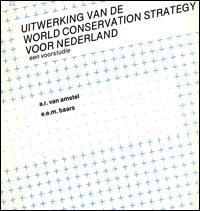

Related content
Leidraad en toolkit voor effectbeoordelingen in een Werelderfgoedcontext
Ten tijden van de vijftigste verjaardag van het Werelderfgoedverdrag in 2022 zijn wereldwijd meer dan 1100 erfgoederen erkend als Werelderfgoed, plekken die zo waardevol zijn voor de mensheid dat het behoud ervan als onze gezamenlijke verantwoordelijkheid wordt gezien. Toch staan veel van deze uitzonderlijke plekken steeds meer onder druk, door verschillende soorten projectontwikkeling op en rondom de erfgoederen. Het beoordelen van het effect van dergelijke projecten, voordat wordt besloten of ze kunnen worden uitgevoerd, is essentieel om schade aan Werelderfgoed te voorkomen en om duurzame opties te identificeren. In deze Leidraad en toolkit voor effectbeoordelingen in een Werelderfgoedcontext wordt het proces uitgelegd waarmee deze doelen kunnen worden bereikt. Met praktische tips en hulpmiddelen, zoals checklists en een begrippenlijst, schept dit document een kader voor het uitvoeren van effectbeoordelingen voor plekken met cultureel en natuurlijk erfgoed.
Lessons learned from environmental accounting : findings from nine case studies
Environmental accounting—the modification of the national income accounts to take into consideration the economic role of the environment—has grown in importance over the past ten years. However, many countries have not yet implemented such accounts, and there is much controversy about whether and how to do so. This paper aims to shed light on this situation through nine country case studies: Norway, The Netherlands, Sweden, France, Canada, The Philippines, Namibia, Germany, and the United States.
Green bonds and integrated landscape management
The Netherlands Enterprise Agency and the Ministry of Economic Affairs commissioned IUCN NL to research how innovative financial instruments such as green bonds can help scaling up Integrated Landscape Management (ILM) initiatives in the Netherlands. Green bonds are fixed-income instruments that enable capital-raising and investment for new and existing projects with environmental benefits. This report shows that accessing capital markets through green bonds to finance landscape initiatives in the Netherlands is possible, but conditions apply.
Solutions in focus : transboundary protected area solutions
PANORAMA is a partnership initiative to facilitate learning from success in conservation. It promotes examples of inspiring solutions that showcase how nature conservation can benefit society. PANORAMA enables the wider application of such solutions through cross-sectoral global learning and exchange. Through a modular case study format, solutions are dissected into their replicable “building blocks”. This booklet is the first in a series of compilations assembling PANORAMA solution case studies on a defined topic. It is a snapshot of the PANORAMA portfolio at a given time, rather than a representative assembly of selected “best practices” on the issue at hand. All solutions featured in this booklet, and many others, are available on the PANORAMA web platform.
Going Dutch : an analysis of the import of live animals from Indonesia by the Netherlands
The aim of this study was to gain insights into the import-export relationships between Indonesia and the Netherlands by studying the trade in live animals from 2003 to 2013. The true dynamics of the trade between both countries are relatively poorly understood. This report allows a better understanding of the role of the Netherlands as an importing country, and Indonesia as an exporter of live animal species by providing an overview of trade dynamics. The results can be used to guide future policy and regulatory interventions and highlight issues of concern.
Ethics and climate change : a study of national commitments
Climate change is the most significant moral and environmental issue of our time. This project seeks to help deepen explicit ethical reflection around the world on national responses to climate change by developing a publicly available record on national compliance with ethical obligations for climate change similar to the reports that are now available on national compliance with human rights obligations.
World Heritage sites and the extractive industries
This short independent study focuses on the relationship between the extractive industries and natural World Heritage properties. It was commissioned through IUCN in conjunction with the World Heritage Centre, as well as the International Council on Mining and Metals (ICMM) and Shell; the latter two funded the exercise. Although its focus is on decisions that may be taken in this regard by the World Heritage Committee, the review is intended to inform a wider range of stakeholders about the issues, challenges and opportunities arising from the tension and potential interdependence between the economic imperatives of mineral and hydrocarbon extraction and the conservation imperatives of preserving the world’s natural heritage.
The World Conservation Union (IUCN) in Nepal : National Conservation Strategy Implementation Programme, 1990-1992
The IUCN has established a project office in Nepal to assist in implementing the National Conservation Strategy (NCS). In these pages, IUCN presents the Union's current activities in the country, future plans and methods of operation.
IUCN SSC Richtlijnen inzake trofeejacht als instrument : versie 1.0
This document builds on existing IUCN policies by setting forth SSC guiding principles on the use of “trophy hunting”, as defined in Section II, as a tool for creating incentives for the conservation of species and their habitats and for the equitable sharing of the benefits of use of natural resources.

